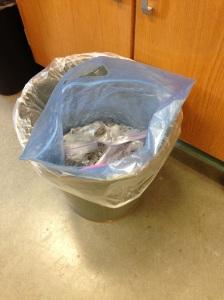
How my science ended up in the trash
By Jessica Ernakovich
As our lab manager struggles to clean out our -80C freezer, some of my samples just ended up here.
So, how did I end up doing garbage science?
It’s pretty simple. I didn’t start with a clear question, so I didn’t know what to analyze in the end. I didn’t know what story I was even attempting to tell. This was the first experiment of my Ph.D., and having done my undergraduate research projects in organic synthesis of pharmaceutical precursors, I was wholly unprepared for all of the variables in a soil biogeochemistry experiment.
Was it wasted time?
Absolutely not! This was my first time obtaining samples in the field from the ecosystem that I hoped to work in. This was my first time measuring the respiration of soil samples in the lab at near freezing temperatures, and I learned that what all other soil scientists do at 25°C doesn’t work that well below and near 0°C. Instructing an undergraduate how to help with the experiment was comical as I had no idea what I was doing. This was not only a lesson in the importance of experimental design, but also in humility as I constantly had to explain why I didn’t know what to do next.
But, without this “tragic” experience under my belt, I doubt that I would have successfully performed the bigger and more expensive experiments that are becoming my dissertation chapters. That time in the field made me start to question the way that people in the literature were discussing my research interests, and I think I’ve come up with some pretty great ideas since then (and NSF thought so too).
So, moral of the story- know your question and why it is important that you ask it. But, if you find that your approach was wrong, all is not lost… you will be better for the mistakes next time.
